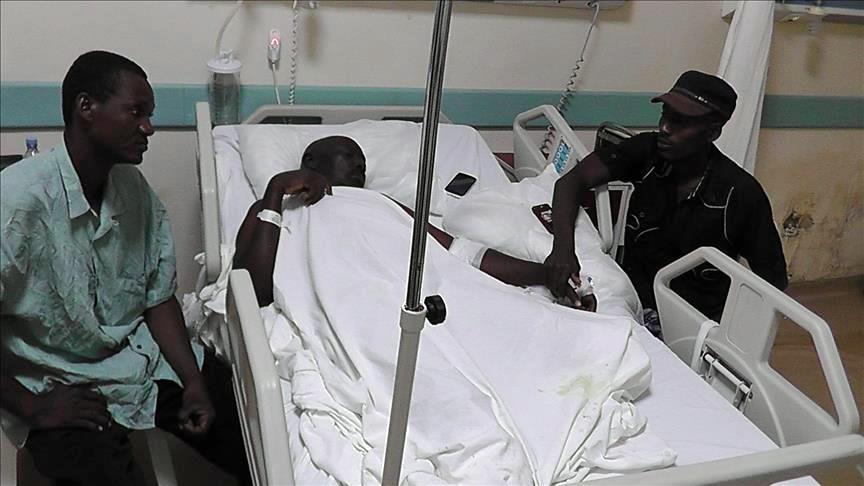 Aadan Ali Barre, one of the many victims of the Mogadishu truck bombing, is comforted by relatives as he recovers in hospital
Aadan Ali Barre, one of the many victims of the Mogadishu truck bombing, is comforted by relatives as he recovers in hospital
By Hassan Istiila and Mohamed Dhaysane
MOGADISHU, Somali
As tales of horror unfold following the weekend's massive truck bombing in capital Mogadishu, Anadolu Agency spoke to some of the survivors at a Turkish-Somali hospital that saved dozens of lives on the day.
At least 300 were killed and hundreds more injured when a truck packed with hundreds of kilograms of explosives wiped out a busy road junction on Saturday afternoon in Mogadishu.
Medical staff across the capital struggled to deal with casualties suffering horrendous burns, particularly at the Recep Tayyip Erdogan Hospital, a facility built and run by Somalia and Turkey and named after Turkey’s president.
35 Somalis injured in Mogadishu blast arrive in Turkey
The death toll is likely to rise in what has been described as war-torn Somalia’s worst terror attack. Although no group has claimed responsibility, al-Shabaab terrorists have been blamed.
Many bodies were burned beyond recognition, according to local medical staff.
When Anadolu Agency correspondents visited the hospital,
“I had a business center where the explosion occurred,” the 45-year-old said. “My head [and] other parts of my body were burnt. I wasn’t able to tell how the situation was after the bomb.
“Some of my customers who were with me were killed in the explosion.”
As Somali and Turkish doctors worked on other victims nearby, Ali thanked them for their help.
Turkish Red Crescent gives aid to Somalia blast victims
Aadan Ali Barre lost both his legs in the blast and was unconscious as medical staff fought to save his life.
His family told Anadolu Agency how he used to work for the Red Cross and had gone to meet a friend at the junction where the explosion took place.
Friends killed
On a nearby bed, Abdullahi Moalim Farah lay with bandages covering his abdomen and shoulder.
The 25-year-old described how he was making his way to the mosque in the area when he was caught in the explosion.
Some of his friends were killed and Farah said he would never have imagined that he would witness such an atrocity in his lifetime.
Said Abdulqadir, director of the Aamin Ambulance Service, said the bombing had left so many dead and injured that his fleet of 10 ambulances
“The Aamin ambulances did what we could,” he said. “Our 10 ambulances were not enough to take all the injured and dead to hospital.
“Everywhere you looked, there were dead bodies. Everywhere you turned, there were wounded people crying for help.”
As the numbers of casualties clogged hospitals and clinics in Mogadishu, many were treated in hallways as operation theaters became overrun.
Dr. Hussein Mohamed, director of the Recep Tayyip Erdogan Hospital, said staff treated hundreds of patients on Saturday and were still caring for victims.
“The total number of injured brought to Erdogan Hospital, Mogadishu, is 207,” he said. “Eleven were dead and 10 severely injured and were airlifted to Turkey.”
In all, 35 of the most seriously injured were flown to Turkey for treatment, including three children. Turkish Health Minister Ahmet Demircan flew to Mogadishu to oversee the evacuation to Ankara.
Turkey was the first country to respond, sending 33 health officials, including a medical team specializing in emergency treatment.
Doctors praised
Mohamed added: “Most of the injuries were fractures and burns, but they received what they expected [from] us.”
He praised 23 doctors sent by the Turkish government to Somalia and thanked Turkey for its wholehearted support.
Thirty wounded remained at the hospital on Tuesday.
African MPs laud Turkey for airlifting injured Somalis
Meanwhile, thousands of ethnic Somalis living in the Eastleigh area of
“I came here to give my blood to those who were injured in the bomb attack,” one donor, Ali Rashid, told Anadolu Agency. “It was a terrible attack and al-Shabaab will pay for the blood that it has spilled.”
Abdirizak Salim, an organizer of the blood drive, said the number of donors had far exceeded the 1,000 anticipated.
The weight of numbers led to the donations being held over two days.
Once the blood is transfused it will be transported by air to Somalia, Salim said.
President Mohamed Abdullahi Mohamed declared three days of national mourning after the bombing, which came to an end on Tuesday.
However, many Somalis are still in mourning and will continue to do so for a long time to come.
* Andrew Wasike and Magdalene Mukami contributed to this story from Nairobi, Kenya.
Anadolu Agency website contains only a portion of the news stories offered to subscribers in the AA News Broadcasting System (HAS), and in summarized form. Please contact us for subscription options.







